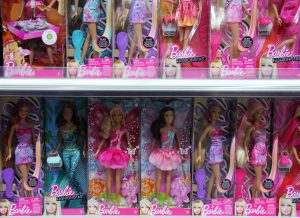Any of Vietnam’s moviegoers wishing to catch the anticipated Hollywood film “Barbie” later this month will have to go to considerable lengths to do so, after the government announced that it was blocking the domestic distribution of the film over scenes with a map showing China’s claims to territory in the South China Sea.
According to reports in state media, Vietnamese officials claim that several scenes in the movie feature a map including a depiction of the “nine-dash line,” which is used by Beijing to illustrate its expansive maritime claims in the disputed seaway, which clash with Vietnam’s own claims.
“The film review board watched the film and made the decision to ban the screening of this movie in Vietnam due to a violation regarding the ‘nine-dash line’,” Vi Kien Thanh, the director of Vietnam’s Department of Cinema, told the Dan Tri news site, according to AFP.
The “nine-dash line,” or “U-shaped line,” forms the basis of China’s vaguely delineated but maximalist claims to nearly the entire South China Sea. Looping downward from the southern part of the Chinese mainland along the littorals of Southeast Asia, it embraces large swathes of the Exclusive Economic Zones of Vietnam and the Philippines, as well as waters claimed by Malaysia, Brunei, and Indonesia. The Chinese claim was ruled legally invalid by an arbitral tribunal in The Hague in 2016, a ruling that Beijing has refused to acknowledge.
“Barbie,” a shameless mining of Mattel I.P. that was due to be released in Vietnam on July 21, is not the first film to find itself in troubled waters with Vietnam’s censors, who screen all international releases for gratuitous violence and sex scenes, in addition to politically-sensitive material.
Last year, “Uncharted,” an action-and-adventure movie starring Tom Holland, was banned from theaters due to scenes that featured the Chinese claim. This came after DreamWorks’ animated film “Abominable” was blocked from domestic distribution in Vietnam, Malaysia, and the Philippines in 2019, for including a map showing the “nine-dash line,” while Netflix Vietnam removed several episodes of the Australian spy drama “Pine Gap” in 2021, even though the film’s dialogue described the claims as disputed.
Vietnamese censors have also cut specific scenes from other films and TV shows, including a scene in the hit film “Crazy Rich Asians” that featured a designer bag with a map of the world showing disputed South China Sea islands under Beijing’s control.
All of this raises the question of why Hollywood producers keep wading into these troubled waters. One would have thought that repeated controversies would alert them to the importance of steering clear of sensitive territorial disputes. Indeed, with every controversy involving the “nine-dash line,” it becomes harder to avoid the suspicion that this is not accidental at all: that the depiction of Chinese claims in otherwise mostly irrelevant contexts is a purposeful attempt by producers to ingratiate themselves with Chinese officials and moviegoers.

































